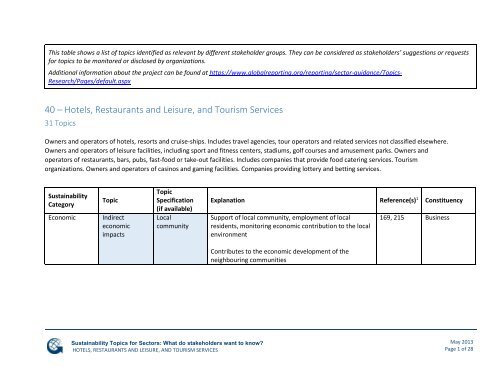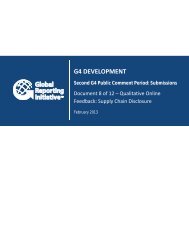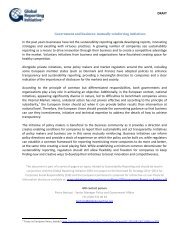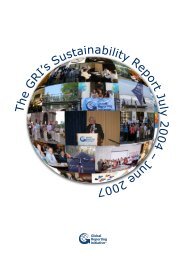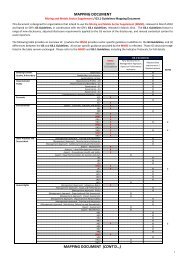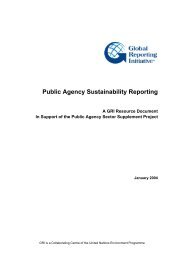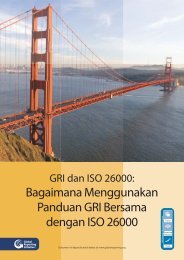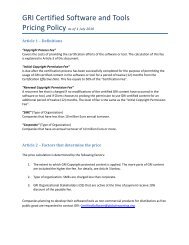40 – Hotels, Restaurants and Leisure, and Tourism Services
40 – Hotels, Restaurants and Leisure, and Tourism Services
40 – Hotels, Restaurants and Leisure, and Tourism Services
You also want an ePaper? Increase the reach of your titles
YUMPU automatically turns print PDFs into web optimized ePapers that Google loves.
This table shows a list of topics identified as relevant by different stakeholder groups. They can be considered as stakeholders’ suggestions or requests<br />
for topics to be monitored or disclosed by organizations.<br />
Additional information about the project can be found at https://www.globalreporting.org/reporting/sector-guidance/Topics-<br />
Research/Pages/default.aspx<br />
<strong>40</strong> <strong>–</strong> <strong>Hotels</strong>, <strong>Restaurants</strong> <strong>and</strong> <strong>Leisure</strong>, <strong>and</strong> <strong>Tourism</strong> <strong>Services</strong><br />
31 Topics<br />
Owners <strong>and</strong> operators of hotels, resorts <strong>and</strong> cruise-ships. Includes travel agencies, tour operators <strong>and</strong> related services not classified elsewhere.<br />
Owners <strong>and</strong> operators of leisure facilities, including sport <strong>and</strong> fitness centers, stadiums, golf courses <strong>and</strong> amusement parks. Owners <strong>and</strong><br />
operators of restaurants, bars, pubs, fast-food or take-out facilities. Includes companies that provide food catering services. <strong>Tourism</strong><br />
organizations. Owners <strong>and</strong> operators of casinos <strong>and</strong> gaming facilities. Companies providing lottery <strong>and</strong> betting services.<br />
Sustainability<br />
Category<br />
Economic<br />
Topic<br />
Indirect<br />
economic<br />
impacts<br />
Topic<br />
Specification<br />
(if available)<br />
Local<br />
community<br />
Explanation Reference(s) 1 Constituency<br />
Support of local community, employment of local<br />
residents, monitoring economic contribution to the local<br />
environment<br />
169, 215 Business<br />
Contributes to the economic development of the<br />
neighbouring communities<br />
Sustainability Topics for Sectors: What do stakeholders want to know?<br />
HOTELS, RESTAURANTS AND LEISURE, AND TOURISM SERVICES<br />
May 2013<br />
Page 1 of 28
Sustainability<br />
Category<br />
Environmental<br />
Topic<br />
Materials<br />
sourcing<br />
Topic<br />
Specification<br />
(if available)<br />
Sourcing<br />
st<strong>and</strong>ards <strong>and</strong><br />
practices for<br />
cleaning<br />
products -<br />
Environmental,<br />
health <strong>and</strong><br />
safety criteria<br />
Explanation Reference(s) 1 Constituency<br />
Sustainable procurement covers measures taken by<br />
companies to integrate environmental <strong>and</strong> social criteria<br />
in the selection <strong>and</strong> management of suppliers.<br />
Sub-sector: Cleaning Products<br />
¦ Formal sourcing policy covering environmental <strong>and</strong><br />
social issues<br />
¦ Information on the integration of environmental,<br />
health <strong>and</strong> safety criteria when purchasing cleaning<br />
products<br />
¦ Details on environmental product specifications for<br />
purchase<br />
¦ REACH (or other international st<strong>and</strong>ards) compliance<br />
¦ % of green cleaning products purchased with ecolabels<br />
¦ audit of suppliers on environmental or social issues<br />
(e.g. subcontractors on health <strong>and</strong> safety risk, working<br />
conditions) <strong>and</strong> percentage of suppliers audited<br />
¦ percentage of buyers trained on sustainable purchases<br />
133, 152 Financial<br />
Markets &<br />
Information<br />
Users<br />
¦ Purchasing of products with reduced environmental<br />
impacts (including harmful chemicals, ecolabels), are<br />
directly of concerns in the industry. Sector leaders select<br />
products <strong>and</strong> suppliers based on environmental<br />
specifications, which include compliance with REACH or<br />
ROHS. Cleaning company can shortlist preferred<br />
suppliers with more environmentally friendly alternatives<br />
(eco-products).<br />
¦ Specific attention has to be given also to suppliers of<br />
cleaning products' health <strong>and</strong> safety management<br />
Sustainability Topics for Sectors: What do stakeholders want to know?<br />
HOTELS, RESTAURANTS AND LEISURE, AND TOURISM SERVICES<br />
May 2013<br />
Page 2 of 28
Sustainability<br />
Category<br />
Topic<br />
Topic<br />
Specification<br />
(if available)<br />
Sourcing<br />
st<strong>and</strong>ards <strong>and</strong><br />
practices for<br />
cleaning<br />
products -<br />
International<br />
<strong>and</strong> national<br />
st<strong>and</strong>ards on<br />
the restriction<br />
of chemicals<br />
<strong>and</strong>/or<br />
hazardous<br />
substances<br />
Explanation Reference(s) 1 Constituency<br />
system as employees are h<strong>and</strong>ling potentially harmful<br />
chemical products<br />
Sustainable procurement covers measures taken by<br />
companies to integrate environmental <strong>and</strong> social criteria<br />
in the selection <strong>and</strong> management of suppliers.<br />
Sub-sector: Cleaning Products<br />
¦ Formal sourcing policy covering environmental <strong>and</strong><br />
social issues<br />
¦ Information on the integration of environmental,<br />
health <strong>and</strong> safety criteria when purchasing cleaning<br />
products<br />
¦ Details on environmental product specifications for<br />
purchase<br />
¦ REACH (or other international st<strong>and</strong>ards) compliance<br />
¦ % of green cleaning products purchased with ecolabels<br />
¦ audit of suppliers on environmental or social issues<br />
(e.g. subcontractors on health <strong>and</strong> safety risk, working<br />
conditions) <strong>and</strong> percentage of suppliers audited<br />
¦ percentage of buyers trained on sustainable purchases<br />
133, 152 Financial<br />
Markets &<br />
Information<br />
Users<br />
¦ Purchasing of products with reduced environmental<br />
impacts (including harmful chemicals, ecolabels), are<br />
directly of concerns in the industry. Sector leaders select<br />
products <strong>and</strong> suppliers based on environmental<br />
specifications, which include compliance with REACH or<br />
ROHS. Cleaning company can shortlist preferred<br />
suppliers with more environmentally friendly alternatives<br />
(eco-products).<br />
¦ Specific attention has to be given also to suppliers of<br />
Sustainability Topics for Sectors: What do stakeholders want to know?<br />
HOTELS, RESTAURANTS AND LEISURE, AND TOURISM SERVICES<br />
May 2013<br />
Page 3 of 28
Sustainability<br />
Category<br />
Topic<br />
Topic<br />
Specification<br />
(if available)<br />
Sourcing<br />
st<strong>and</strong>ards <strong>and</strong><br />
practices for<br />
food <strong>and</strong><br />
beverages<br />
Explanation Reference(s) 1 Constituency<br />
cleaning products' health <strong>and</strong> safety management<br />
system as employees are h<strong>and</strong>ling potentially harmful<br />
chemical products<br />
Impacts of Food & Beverage Procurement<br />
Practices <strong>and</strong> performance related to food <strong>and</strong> beverage<br />
procurement<br />
Major impacts identified through food <strong>and</strong> beverage<br />
procurement<br />
457 Mediating<br />
Institution<br />
Food <strong>and</strong> beverage operations are often part of fullservice<br />
hotels, though they may not be directly under the<br />
hotel’s operational control. Furthermore, food <strong>and</strong><br />
beverage operations are rarely the primary revenue<br />
source or business model for a hotel. At the same time,<br />
environmental <strong>and</strong> social issues surrounding food <strong>and</strong><br />
beverage are often among the most relevant to guests<br />
<strong>and</strong> other stakeholders As such, the scope of material<br />
issues for a food <strong>and</strong> beverage company has certain<br />
overlap with full-service hotels, but in relation to other<br />
topics <strong>and</strong> aspects of hotel operations may be less<br />
material. Practices relating to food <strong>and</strong> beverage should<br />
be further evaluated as to their boundary <strong>and</strong> level of<br />
inclusion in reporting.<br />
Much overlap exists with Food & Beverage companies<br />
<strong>and</strong> restaurant companies, however in hotel companies<br />
the issue arises as a general topic rather than the<br />
itemized topics within Food & Beverage that may arise<br />
individually as material for a foodservice company.<br />
Sustainability Topics for Sectors: What do stakeholders want to know?<br />
HOTELS, RESTAURANTS AND LEISURE, AND TOURISM SERVICES<br />
May 2013<br />
Page 4 of 28
Sustainability<br />
Category<br />
Topic<br />
Materials<br />
sourcing <strong>and</strong><br />
use<br />
Topic<br />
Specification<br />
(if available)<br />
Operational<br />
supplies<br />
Explanation Reference(s) 1 Constituency<br />
Significant impacts from the purchase <strong>and</strong> disposal of<br />
operational supplies<br />
Key operational supplies with environmental <strong>and</strong> social<br />
impact risks<br />
Actions to minimize impacts of key operational supply<br />
purchases<br />
457 Mediating<br />
Institution<br />
<strong>Hotels</strong> have a diverse supply chain encompassing<br />
hundreds of products. It is important to identify which<br />
purchases have the most significant impact in their<br />
disposal. Significance may be by weight of products, their<br />
environmental impacts from associated materials, the<br />
reusability or recyclability of their design <strong>and</strong> waste<br />
infrastructure. Examples mentioned include mattresses<br />
<strong>and</strong> carpeting.<br />
It is important to identify which purchases have the most<br />
significant impact in their upstream lifecycle. Significance<br />
may be by scarcity of raw materials, environmental &<br />
social impacts of their manufacture <strong>and</strong> distribution, <strong>and</strong><br />
stakeholder perception. Examples mentioned include<br />
bathroom tissue.<br />
International <strong>Tourism</strong> Partnership working group has<br />
been established on Supply chain issues<br />
http://www.tourismpartnership.org/what-wedo/working-groups<br />
Sustainability Topics for Sectors: What do stakeholders want to know?<br />
HOTELS, RESTAURANTS AND LEISURE, AND TOURISM SERVICES<br />
May 2013<br />
Page 5 of 28
Sustainability<br />
Category<br />
Topic<br />
Topic<br />
Specification<br />
(if available)<br />
Wood-based<br />
products from<br />
responsibly<br />
managed forests<br />
Explanation Reference(s) 1 Constituency<br />
Sourcing of wood based products (paper, furniture, etc)<br />
from responsibly managed forests.<br />
The following sections of the GRI reporting guidelines<br />
may be used by a reporter to mention FSC related<br />
activities, those are:<br />
- Profile - Commitments to External Initiatives: 4.12<br />
externally developed economic, environmental, <strong>and</strong><br />
social charters, principles, or other initiatives to which<br />
the organization subscribes or endorses.<br />
- Environmental Impact: EN 26: Initiatives to mitigate<br />
environmental impacts of products <strong>and</strong> services, <strong>and</strong><br />
extent of impact mitigation.<br />
- Product: PR3: Type of product <strong>and</strong> service information<br />
required by procedures <strong>and</strong> percentage of significant<br />
products <strong>and</strong> services subject to such information<br />
requirements.<br />
The above indicators are mostly not quantitative <strong>and</strong> a<br />
reporter may find difficult to integrate FSC related<br />
information.<br />
Ideally there would be a quantitative indicator related to<br />
certification scheme or initiative regarding the supply<br />
<strong>and</strong> the final product within the GRI guideline.<br />
185, 569 Civil Society<br />
Organization<br />
In order to ease the reporting of FSC related activities,<br />
we propose to include two indicators related to supply<br />
<strong>and</strong> final product content. The wording could follow the<br />
Food Processing Supplement <strong>and</strong> worded as follows:<br />
“Percentage of purchased material by volume <strong>and</strong><br />
weight which is verified as being in accordance with<br />
Sustainability Topics for Sectors: What do stakeholders want to know?<br />
HOTELS, RESTAURANTS AND LEISURE, AND TOURISM SERVICES<br />
May 2013<br />
Page 6 of 28
Sustainability<br />
Category<br />
Topic<br />
Topic<br />
Specification<br />
(if available)<br />
Explanation Reference(s) 1 Constituency<br />
credible, internationally recognized responsible<br />
production st<strong>and</strong>ards, broken down by st<strong>and</strong>ard”.<br />
This topic reflects significant impacts, risks <strong>and</strong><br />
opportunities for an organization itself <strong>and</strong> its<br />
stakeholders as well as requires active management or<br />
engagement by the organization.<br />
By buying FSC certified products, companies provide<br />
incentives for responsible forestry <strong>and</strong> can enjoy their<br />
purchases knowing it has not contributed to the<br />
destruction of the world’s forest or even come from<br />
companies involved in human rights abuses. Almost<br />
everything made from wood <strong>and</strong> other forest products<br />
are available with the FSC label. Finding FSC products<br />
becomes easier everyday. Literally every day, more FSC<br />
products become available.<br />
This topic is relevant for all 52 business/industry activity<br />
groups.<br />
These simple steps can be followed by companies to find<br />
<strong>and</strong> buy FSC products:<br />
1. Check the FSC marketplace at marketplace.fsc.org (in<br />
January 2013, the marketplace is still a beta version)<br />
Please note this database will currently only search for<br />
manufacturers <strong>and</strong> distributors, not retailers. There are<br />
only a few exceptions where retailers are also certified.<br />
To find products carried by your local retailer, please<br />
contact them directly. We are working on including other<br />
search options to this database in the future.<br />
Sustainability Topics for Sectors: What do stakeholders want to know?<br />
HOTELS, RESTAURANTS AND LEISURE, AND TOURISM SERVICES<br />
May 2013<br />
Page 7 of 28
Sustainability<br />
Category<br />
Topic<br />
Plastics use <strong>and</strong><br />
management<br />
Topic<br />
Specification<br />
(if available)<br />
Explanation Reference(s) 1 Constituency<br />
2. Ask your retailer<br />
Chances are, they will carry FSC certified products. If not,<br />
let them know you would be interested in certified<br />
products. Not all certification systems are equal <strong>and</strong> only<br />
FSC guarantees that the product has been made from<br />
environmentally <strong>and</strong> responsibly managed forests.<br />
By asking for FSC certified products, you show that there<br />
is a dem<strong>and</strong>. This is an important <strong>and</strong> simple way how<br />
you can help FSC to make a difference.<br />
Plastic, a valuable material, can generate significant<br />
positive, or negative, impacts on economy, environment<br />
<strong>and</strong> society. Plastic should be treated as a resource <strong>and</strong><br />
managed judiciously.<br />
353, 367 Civil Society<br />
Organization<br />
A disclosure on management approach for plastics,<br />
including governance, strategy, risks, opportunities,<br />
considering: opportunities for product redesign,<br />
increasing recycled content, implementing reclaim<br />
<strong>and</strong>/or reuse which could attract economies, br<strong>and</strong><br />
loyalty, investment, employee goodwill, <strong>and</strong>; risks to the<br />
business, stakeholder health, environment <strong>and</strong> society<br />
(including reputational/social license to operate,<br />
regulatory, investor, insurer, <strong>and</strong> liability risks) for<br />
plastics that are directly harmful to stakeholders, or<br />
indirectly through plastics being wasted/littered.<br />
Performance indicators regarding the types <strong>and</strong> volumes<br />
of plastics being used, collected <strong>and</strong>/or distributed<br />
downstream; the portion that is made of post-consumerrecycled,<br />
bio-based, biodegradable, compostable, <strong>and</strong>/or<br />
oxobiodegradable material; the ratio of expected life-<br />
Sustainability Topics for Sectors: What do stakeholders want to know?<br />
HOTELS, RESTAURANTS AND LEISURE, AND TOURISM SERVICES<br />
May 2013<br />
Page 8 of 28
Sustainability<br />
Category<br />
Topic<br />
Topic<br />
Specification<br />
(if available)<br />
Explanation Reference(s) 1 Constituency<br />
span of plastic products in contrast to the duration of<br />
their intended use; these volumes broken down by end<br />
of life disposition.<br />
Most of this disclosure can be captured through the<br />
existing GRI framework (e.g. GRI G3 EC9, EN1, EN2,<br />
EN22), but commentary is needed to ensure disclosers<br />
appreciate the materiality of plastic; these aspects of the<br />
G3.1 EO sector supplement (EO1, E22, E27, SO9, EO8,<br />
EO9, EO11) should be reused for <strong>Hotels</strong>, <strong>Restaurants</strong>,<br />
<strong>Leisure</strong>, <strong>Tourism</strong> <strong>and</strong> also for<br />
facilities/office/dining/catering management. Refer to<br />
the Plastic Disclosure Project ( www.plasticdisclosure.org<br />
) for more details on the suggested questions. PDP will<br />
align its questions to GRI G4 to assist disclosers.<br />
Plastic can have significant positive, or negative, impacts<br />
on the economy, environment <strong>and</strong> society:<br />
Economics: There are significant cost savings available to<br />
organisations that treat plastic as a resource (e.g.<br />
through redesign, use of recycled content, reclaiming,<br />
etc.) <strong>and</strong> risks of increased direct costs (regulation,<br />
liability, cost of capital, insurance) to organisations that<br />
do not lead in this area as well as indirect economic costs<br />
to impacted industries (e.g. food production, tourism)<br />
Environment: Plastics that are wasted or littered<br />
become extremely harmful to the environment, which<br />
will have a material effect on biodiversity <strong>and</strong> the global<br />
food chain, both nearby <strong>and</strong> far outside the local area of<br />
operations<br />
Society: Some plastics are harmful to stakeholders<br />
Sustainability Topics for Sectors: What do stakeholders want to know?<br />
HOTELS, RESTAURANTS AND LEISURE, AND TOURISM SERVICES<br />
May 2013<br />
Page 9 of 28
Sustainability<br />
Category<br />
Topic<br />
Topic<br />
Specification<br />
(if available)<br />
Explanation Reference(s) 1 Constituency<br />
during manufacture, use <strong>and</strong>/or disposal (e.g. due to<br />
phthalates, BPA), impact the wellbeing of society (e.g.<br />
effect of litter on community spirit <strong>and</strong> their interest in<br />
sustainability).<br />
While a valuable invention, which benefits society in<br />
many ways, the negative impacts associated with<br />
society's growing use of plastic are not fully recognised.<br />
Roughly 85% of plastic used in products <strong>and</strong> packaging is<br />
not recycled, <strong>and</strong> most plastic produced in the last 60<br />
years still remains in the environment today.<br />
Approximately 70% of discarded plastic is from single-use<br />
food <strong>and</strong> beverage containers. Discarded plastics persist<br />
in the environment for dozens or hundreds of years,<br />
accumulating across the globe, often out of sight of the<br />
producers <strong>and</strong> users. The direct physical impacts of<br />
plastic are significant to the organisation in increased<br />
costs or missed opportunities, <strong>and</strong> related economies<br />
(e.g. over $1.2bn in annual damages to ocean-related<br />
industries in Asia-Pacific), the environment through<br />
harming habitats <strong>and</strong> species, <strong>and</strong> to stakeholders health<br />
when exposed to the chemical ingredients; <strong>and</strong> are<br />
magnified if fragmentation of the plastic occurs, making<br />
it available for ingestion to additional species, who<br />
adsorb the chemical ingredients <strong>and</strong>/or the toxins carried<br />
on the plastic. These negative impacts could be avoided<br />
<strong>and</strong> turned into positive impacts, if plastic was treated as<br />
a resource to be managed judiciously (e.g. the US<br />
economy lost $8.3bn worth of plastic packaging in 2010)<br />
Sustainability Topics for Sectors: What do stakeholders want to know?<br />
HOTELS, RESTAURANTS AND LEISURE, AND TOURISM SERVICES<br />
May 2013<br />
Page 10 of 28
Sustainability<br />
Category<br />
Topic<br />
Energy<br />
consumption<br />
Topic<br />
Specification<br />
(if available)<br />
Hotel<br />
operations<br />
Explanation Reference(s) 1 Constituency<br />
- "It is not good business practice to throw away valuable<br />
resources".<br />
Significant consumption of resources from hotel<br />
operations<br />
455, 456 Mediating<br />
Institution<br />
Energy usage, water usage, materials <strong>and</strong> waste<br />
generation/disposal/diversion, GHG emissions, per room<br />
night for site consumption.<br />
The use phase of hotels is the most consumptive <strong>and</strong><br />
relevant to all stakeholders from the viewpoint of hotel<br />
operations. All hotel companies that publish GRI reports<br />
will report some type of energy, water, waste, <strong>and</strong><br />
carbon indicators, either in aggregate, in units of<br />
intensity, or both.<br />
Though all companies disclose this information, more<br />
precision is needed to st<strong>and</strong>ardize the boundaries,<br />
quantification methods, <strong>and</strong> metrics used to enable<br />
common reporting <strong>and</strong> comparison globally. This has<br />
been done for carbon footprints for room nights but not<br />
at an organizational level <strong>and</strong> not for all relevant metrics.<br />
See also the Hotel Carbon Measurement Initiative which<br />
has produced guidance documents, using wide industry<br />
collaboration <strong>and</strong> stakeholder consultation.<br />
http://www.wttc.org/activities/environment/hotelcarbon-measurement-initiative/<br />
Control of energy <strong>and</strong> water consumption, reduction of<br />
GHG emissions, measures taken to become more energy-<br />
215 Business<br />
Sustainability Topics for Sectors: What do stakeholders want to know?<br />
HOTELS, RESTAURANTS AND LEISURE, AND TOURISM SERVICES<br />
May 2013<br />
Page 11 of 28
Sustainability<br />
Category<br />
Topic<br />
Topic<br />
Specification<br />
(if available)<br />
Explanation Reference(s) 1 Constituency<br />
efficient<br />
Energy<br />
efficiency of<br />
operations<br />
Energy use has to be efficient not to place burden on the<br />
environment <strong>and</strong> to become more profitable<br />
Energy consumption, total 153 Financial<br />
Markets &<br />
Information<br />
Users<br />
Control of energy <strong>and</strong> water consumption, reduction of 215 Business<br />
GHG emissions, measures taken to become more energyefficient<br />
Fuel<br />
consumption<br />
Water<br />
consumption<br />
Energy use has to be efficient not to place burden on the<br />
environment <strong>and</strong> to become more profitable<br />
Ships fuel consumption of vessels by ship-type 153 Financial<br />
Markets &<br />
Information<br />
Users<br />
Hotel<br />
Significant consumption of resources from hotel<br />
455, 456 Mediating<br />
operations operations<br />
Institution<br />
Energy usage, water usage, materials <strong>and</strong> waste<br />
generation/disposal/diversion, GHG emissions, per room<br />
night for site consumption.<br />
The use phase of hotels is the most consumptive <strong>and</strong><br />
relevant to all stakeholders from the viewpoint of hotel<br />
operations. All hotel companies that publish GRI reports<br />
will report some type of energy, water, waste, <strong>and</strong><br />
carbon indicators, either in aggregate, in units of<br />
Sustainability Topics for Sectors: What do stakeholders want to know?<br />
HOTELS, RESTAURANTS AND LEISURE, AND TOURISM SERVICES<br />
May 2013<br />
Page 12 of 28
Sustainability<br />
Category<br />
Topic<br />
Topic<br />
Specification<br />
(if available)<br />
Explanation Reference(s) 1 Constituency<br />
intensity, or both.<br />
Though all companies disclose this information, more<br />
precision is needed to st<strong>and</strong>ardize the boundaries,<br />
quantification methods, <strong>and</strong> metrics used to enable<br />
common reporting <strong>and</strong> comparison globally. This has<br />
been done for carbon footprints for room nights but not<br />
at an organizational level <strong>and</strong> not for all relevant metrics.<br />
See also the Hotel Carbon Measurement Initiative which<br />
has produced guidance documents, using wide industry<br />
collaboration <strong>and</strong> stakeholder consultation.<br />
http://www.wttc.org/activities/environment/hotelcarbon-measurement-initiative/<br />
Control of energy <strong>and</strong> water consumption, reduction of<br />
GHG emissions, measures taken to becme more energyefficient<br />
215 Business<br />
Water<br />
withdrawal<br />
Water<br />
consumption<br />
<strong>and</strong><br />
management in<br />
water scarce<br />
areas<br />
Energy use has to be efficient not to place burden on the<br />
environment <strong>and</strong> to become more profitable<br />
Water consumption in m 3 153 Financial<br />
Markets &<br />
Information<br />
Users<br />
Impacts associated with water withdrawals, usage, <strong>and</strong> 337, 457 Mediating<br />
discharge in water-scarce locations of operation<br />
Institution<br />
Hotel operations located within water-stressed areas<br />
Water withdrawals in water-stressed areas<br />
Water consumption <strong>and</strong> conservation efforts from<br />
Sustainability Topics for Sectors: What do stakeholders want to know?<br />
HOTELS, RESTAURANTS AND LEISURE, AND TOURISM SERVICES<br />
May 2013<br />
Page 13 of 28
Sustainability<br />
Category<br />
Topic<br />
Topic<br />
Specification<br />
(if available)<br />
Explanation Reference(s) 1 Constituency<br />
operations<br />
Water discharge in locations without adequate<br />
wastewater treatment infrastructure<br />
Guest engagement for water conservation<br />
Water scarcity has the potential to impact operational<br />
costs, feasibility of development, community relations,<br />
<strong>and</strong> other environmental impacts. The impacts<br />
associated with water may go beyond operations inside<br />
the hotel building. In addition, the guest experience can<br />
be affected in several ways relating to water.<br />
Wastewater<br />
Management<br />
<strong>and</strong> treatment<br />
See roundtable proceedings document, <strong>and</strong> see also<br />
Reference document #1 for Material Topic #5 below.<br />
Impacts associated with water withdrawals, usage, <strong>and</strong><br />
discharge in water-scarce locations of operation<br />
337, 457 Mediating<br />
Institution<br />
Hotel operations located within water-stressed areas<br />
Water withdrawals in water-stressed areas<br />
Water consumption <strong>and</strong> conservation efforts from<br />
operations<br />
Water discharge in locations without adequate<br />
wastewater treatment infrastructure<br />
Guest engagement for water conservation<br />
Water scarcity has the potential to impact operational<br />
costs, feasibility of development, community relations,<br />
<strong>and</strong> other environmental impacts. The impacts<br />
associated with water may go beyond operations inside<br />
the hotel building. In addition, the guest experience can<br />
Sustainability Topics for Sectors: What do stakeholders want to know?<br />
HOTELS, RESTAURANTS AND LEISURE, AND TOURISM SERVICES<br />
May 2013<br />
Page 14 of 28
Sustainability<br />
Category<br />
Topic<br />
Topic<br />
Specification<br />
(if available)<br />
Explanation Reference(s) 1 Constituency<br />
be affected in several ways relating to water.<br />
See roundtable proceedings document, <strong>and</strong> see also<br />
Reference document #1 for Material Topic #5 below.<br />
Treatment <strong>and</strong> reuse of wastewater, implementation of<br />
a solid waste management plan, management <strong>and</strong><br />
reduction of chemicals used <strong>and</strong> pollution<br />
215 Business<br />
Biodiversity,<br />
ecosystem <strong>and</strong><br />
habitat<br />
protection<br />
Impacts of<br />
tourism on<br />
coastal <strong>and</strong><br />
marine<br />
ecosystems<br />
Inappropriate waste <strong>and</strong> pollution management bears<br />
high environmental <strong>and</strong> health risks.<br />
Overfished, polluted, taken for granted, carelessly<br />
abused <strong>and</strong> destroyed, <strong>and</strong> much more fragile <strong>and</strong><br />
complex than we once thought ... the largest living space<br />
on Earth is fast deteriorating.<br />
Massive influxes of tourists, often to a relatively small<br />
area, have a huge impact. They add to the pollution,<br />
waste, <strong>and</strong> water needs of the local population, putting<br />
local infrastructure <strong>and</strong> habitats under enormous<br />
pressure. Some resorts empty their sewage <strong>and</strong> other<br />
wastes directly into water surrounding coral reefs <strong>and</strong><br />
other sensitive marine habitats. The increased popularity<br />
of cruise ships has also adversely affected the marine<br />
environment. Carrying up to 4,000 passengers <strong>and</strong> crew,<br />
these enormous floating towns are a major source of<br />
marine pollution through the dumping of garbage <strong>and</strong><br />
untreated sewage at sea, <strong>and</strong> the release of other<br />
shipping-related pollutants<br />
Expenditure on projects for biodiversity, natural<br />
ecosystems, l<strong>and</strong>scapes, protection of coastlines,<br />
609 Civil Society<br />
Organization<br />
153 Financial<br />
Markets &<br />
Sustainability Topics for Sectors: What do stakeholders want to know?<br />
HOTELS, RESTAURANTS AND LEISURE, AND TOURISM SERVICES<br />
May 2013<br />
Page 15 of 28
Sustainability<br />
Category<br />
Topic<br />
Emissions to air<br />
- GHG emissions<br />
Topic<br />
Specification<br />
(if available)<br />
Hotel<br />
operations<br />
Explanation Reference(s) 1 Constituency<br />
protection of natural habitats<br />
Significant consumption of resources from hotel<br />
operations<br />
Information<br />
Users<br />
455, 456 Mediating<br />
Institution<br />
Energy usage, water usage, materials <strong>and</strong> waste<br />
generation/disposal/diversion, GHG emissions, per room<br />
night for site consumption.<br />
The use phase of hotels is the most consumptive <strong>and</strong><br />
relevant to all stakeholders from the viewpoint of hotel<br />
operations. All hotel companies that publish GRI reports<br />
will report some type of energy, water, waste, <strong>and</strong><br />
carbon indicators, either in aggregate, in units of<br />
intensity, or both.<br />
Though all companies disclose this information, more<br />
precision is needed to st<strong>and</strong>ardize the boundaries,<br />
quantification methods, <strong>and</strong> metrics used to enable<br />
common reporting <strong>and</strong> comparison globally. This has<br />
been done for carbon footprints for room nights but not<br />
at an organizational level <strong>and</strong> not for all relevant metrics.<br />
See also the Hotel Carbon Measurement Initiative which<br />
has produced guidance documents, using wide industry<br />
collaboration <strong>and</strong> stakeholder consultation.<br />
http://www.wttc.org/activities/environment/hotelcarbon-measurement-initiative/<br />
Sustainability Topics for Sectors: What do stakeholders want to know?<br />
HOTELS, RESTAURANTS AND LEISURE, AND TOURISM SERVICES<br />
May 2013<br />
Page 16 of 28
Sustainability<br />
Category<br />
Topic<br />
Waste<br />
management<br />
Topic<br />
Specification<br />
(if available)<br />
Generation,<br />
disposal,<br />
diversion<br />
Explanation Reference(s) 1 Constituency<br />
Significant consumption of resources from hotel<br />
operations<br />
Energy usage, water usage, materials <strong>and</strong> waste<br />
generation/disposal/diversion, GHG emissions, per room<br />
night for site consumption.<br />
455, 456 Mediating<br />
Institution<br />
The use phase of hotels is the most consumptive <strong>and</strong><br />
relevant to all stakeholders from the viewpoint of hotel<br />
operations. All hotel companies that publish GRI reports<br />
will report some type of energy, water, waste, <strong>and</strong><br />
carbon indicators, either in aggregate, in units of<br />
intensity, or both.<br />
Though all companies disclose this information, more<br />
precision is needed to st<strong>and</strong>ardize the boundaries,<br />
quantification methods, <strong>and</strong> metrics used to enable<br />
common reporting <strong>and</strong> comparison globally. This has<br />
been done for carbon footprints for room nights but not<br />
at an organizational level <strong>and</strong> not for all relevant metrics.<br />
See also the Hotel Carbon Measurement Initiative which<br />
has produced guidance documents, using wide industry<br />
collaboration <strong>and</strong> stakeholder consultation.<br />
http://www.wttc.org/activities/environment/hotelcarbon-measurement-initiative/<br />
Treatment <strong>and</strong> reuse of wastewater, implementation of<br />
a solid waste management plan, management <strong>and</strong><br />
reduction of chemicals used <strong>and</strong> pollution<br />
215 Business<br />
Sustainability Topics for Sectors: What do stakeholders want to know?<br />
HOTELS, RESTAURANTS AND LEISURE, AND TOURISM SERVICES<br />
May 2013<br />
Page 17 of 28
Sustainability<br />
Category<br />
Topic<br />
Topic<br />
Specification<br />
(if available)<br />
Social Labor conditions Human capital<br />
development<br />
Explanation Reference(s) 1 Constituency<br />
Inappropriate waste <strong>and</strong> pollution management bears<br />
high environmental <strong>and</strong> health risks.<br />
Waste Scope I: Total waste in tonnes<br />
Waste Scope II: Percentage of waste which is recycled<br />
Waste Scope III: Hazardous waste total in tonnes total<br />
The key sustainability factors for the hotels, restaurants,<br />
bars & recreational services sector are linked to its<br />
employees, who drive the business <strong>and</strong> are the face of a<br />
company toward its customers. This makes it<br />
indispensable for companies to employ progressive<br />
human resource policies that include talent attraction<br />
<strong>and</strong> retention, human capital development, occupational<br />
health & safety, <strong>and</strong> group-wide ethical principles that<br />
cover the entire supply chain.<br />
Legal protection of employees, paying living wage, policy<br />
to prevent exploitation<br />
153 Financial<br />
Markets &<br />
Information<br />
Users<br />
460 Financial<br />
Markets &<br />
Information<br />
Users<br />
169, 215 Business<br />
Migrant workers<br />
Human<br />
trafficking risks<br />
Relevant because of basic human rights to live<br />
Trafficking in persons, or human trafficking, involves the<br />
recruitment, transportation, transfer, harbouring or<br />
receipt of a person (a woman, man or a child), often over<br />
international borders but also frequently within the<br />
boundaries of a single country, for the purpose of<br />
exploitation. It is a widespread abuse, affecting<br />
developing countries, countries in transition <strong>and</strong><br />
industrialized market economies alike. The majority of<br />
victims of human trafficking are between the ages of 18<br />
<strong>and</strong> 24, with most having received a job offer prior to<br />
their departure<br />
249 Mediating<br />
Institution<br />
Sustainability Topics for Sectors: What do stakeholders want to know?<br />
HOTELS, RESTAURANTS AND LEISURE, AND TOURISM SERVICES<br />
May 2013<br />
Page 18 of 28
Sustainability<br />
Category<br />
Topic<br />
Topic<br />
Specification<br />
(if available)<br />
Explanation Reference(s) 1 Constituency<br />
Safe labour migration is a key driver of sustainable<br />
economic development in both sending <strong>and</strong> receiving<br />
countries. The protection of migrant workers is becoming<br />
an increasingly important issue for a number of global<br />
industries, as well as for home <strong>and</strong> host governments.<br />
Trafficking of workers, particularly women <strong>and</strong> girls, into<br />
global supply chains remains a significant reality, in part<br />
due to poorly regulated recruitment industries. Pockets<br />
of good <strong>and</strong> innovative practice in responsible<br />
recruitment <strong>and</strong> combating trafficking exist but have yet<br />
to be taken to scale.<br />
254, 437 Mediating<br />
Institution<br />
Recruitment<br />
<strong>and</strong><br />
employment<br />
Over 215 million international migrants living outside<br />
their countries of origin play a vital role in the global<br />
economy. Recorded remittances received by developing<br />
countries, estimated to be US$325 billion in 2010, far<br />
exceed the volume of official aid flows <strong>and</strong> constitute<br />
more than 10 percent of gross domestic product (GDP) in<br />
many developing countries. The vast majority of migrants<br />
today are low-paid workers in industries ranging from<br />
apparel, electronics <strong>and</strong> construction to agriculture,<br />
hospitality, <strong>and</strong> domestic service. From the point of<br />
recruitment, through employment <strong>and</strong> to the point of<br />
return home, these workers are vulnerable to<br />
exploitation. Protection mechanisms to safeguard their<br />
rights continue to be wholly inadequate <strong>and</strong> access to<br />
legal remedy is poor in both host <strong>and</strong> home countries.<br />
Recruitment <strong>and</strong> employment of migrant workers<br />
Number of migrant workers employed<br />
253 Mediating<br />
Institution<br />
Sustainability Topics for Sectors: What do stakeholders want to know?<br />
HOTELS, RESTAURANTS AND LEISURE, AND TOURISM SERVICES<br />
May 2013<br />
Page 19 of 28
Sustainability<br />
Category<br />
Topic<br />
Topic<br />
Specification<br />
(if available)<br />
Explanation Reference(s) 1 Constituency<br />
Countries of origin<br />
Gender of workers<br />
Positions within company<br />
Length of contracts<br />
Recruitment channels<br />
Any fees for recruitment<br />
Passport retention<br />
Migrant workers both internal <strong>and</strong> external are a<br />
significant <strong>and</strong> growing feature of all company activities.<br />
There are over 200 million migrants in the world. They<br />
are found within nearly all business sectors <strong>and</strong> across all<br />
regions. Many migrant workers, particularly those<br />
working in unskilled jobs are subject to discrimination<br />
<strong>and</strong> are vulnerable to exploitation <strong>and</strong> abuse.<br />
Impacts on local<br />
communities<br />
<strong>and</strong> services<br />
Operation of<br />
tourist<br />
establishments<br />
For many migrants exploitation begins during<br />
recruitment. Exorbitant fees <strong>and</strong> other charges, often at<br />
usurous rates of interest can leave many migrant<br />
workers effectively bonded labour whatever the<br />
subsequent conditions of employment.<br />
Company due dilligence <strong>and</strong> reporting should therefore<br />
extend into the supply chain for labour.<br />
In view of continually increasing transport flows,<br />
companies also need to consider the needs of local<br />
communities in the tourist destinations in which they<br />
operate.<br />
460 Financial<br />
Markets &<br />
Information<br />
Users<br />
Sustainability Topics for Sectors: What do stakeholders want to know?<br />
HOTELS, RESTAURANTS AND LEISURE, AND TOURISM SERVICES<br />
May 2013<br />
Page 20 of 28
Sustainability<br />
Category<br />
Topic<br />
Topic<br />
Specification<br />
(if available)<br />
Explanation Reference(s) 1 Constituency<br />
Effects on locals` access to basic services <strong>and</strong> housing,<br />
respect of their rights for l<strong>and</strong>, water <strong>and</strong> property<br />
acquisitions, , that can affect local communities live<br />
quality<br />
215 Business<br />
Local<br />
community<br />
involvement<br />
Unlawful sex<br />
tourism<br />
Operation of<br />
tourist<br />
establishments<br />
Human<br />
trafficking risks<br />
<strong>and</strong> child abuse<br />
Local communities` life circumstances have to be<br />
ensured <strong>and</strong> their rights respected.<br />
Social projects <strong>and</strong> community involvement at holiday<br />
destinations<br />
Adherence to the Code of conduct for the protection of<br />
children from sexual exploitation in travel <strong>and</strong> tourism<br />
(http://www.thecode.org/)<br />
153 Financial<br />
Markets &<br />
Information<br />
Users<br />
304, 499 Mediating<br />
Institution<br />
Policies <strong>and</strong> management systems related to the Code.<br />
Breach of the code leads to violation of the following<br />
human rights:<br />
Universal declaration of human rights : articles 3, 4,5, 12<br />
<strong>and</strong> 13<br />
Convention on the rights of the child: articles 3, 6, 9, 11,<br />
19, 32, 34 <strong>and</strong> 35<br />
See section 3.3 as example on Kuoni human rights impact<br />
assessment covering children<br />
http://www.kuoni.com/docs/assessing_human_rights_i<br />
mpacts_0.pdf<br />
Unlawful Sex <strong>Tourism</strong> 110, 457 Mediating<br />
Institution<br />
Sustainability Topics for Sectors: What do stakeholders want to know?<br />
HOTELS, RESTAURANTS AND LEISURE, AND TOURISM SERVICES<br />
May 2013<br />
Page 21 of 28
Sustainability<br />
Category<br />
Topic<br />
Topic<br />
Specification<br />
(if available)<br />
Explanation Reference(s) 1 Constituency<br />
Hotel operations in areas of high risk of unlawful sex<br />
tourism<br />
Employee- <strong>and</strong> guest-facing practices to identify <strong>and</strong><br />
mitigate lawful sex tourism<br />
Sex tourism <strong>and</strong> its related risks of human trafficking <strong>and</strong><br />
child abuse are rare in occurrence within hotels.<br />
However, instances of occurrence have substantial<br />
impact. <strong>Hotels</strong> may not necessarily have the ability to<br />
prevent unlawful sex tourism; however they can take<br />
measures to identify occurrences <strong>and</strong> consequently act<br />
to remedy the situation.<br />
Several industry initiatives exist to combat unlawful sex<br />
tourism, such as the ECPAT Code of Conduct <strong>and</strong> the<br />
International <strong>Tourism</strong> Partnership Human Rights Working<br />
Group.<br />
Sex tourism is referenced as one of the worst forms of<br />
child labor by the ILO convention 182.<br />
GOVERNANCE / EUROPE: boardroom lady boom: is it<br />
possible without quotas?<br />
On 22 June, the CapitalCom agency published its 2011<br />
survey into the boardroom gender mix of CAC <strong>40</strong><br />
companies, with fairly encouraging results: the<br />
proportion of women on the board has doubled in recent<br />
years, from 10.5% in 2009 to 20.8% in 2011.<br />
Other<br />
Corporate<br />
governance<br />
Gender<br />
participation on<br />
governance<br />
bodies<br />
389 Financial<br />
Markets &<br />
Information<br />
Users<br />
In January, the French parliament adopted legislation<br />
imposing quotas for the proportion of women on the<br />
Sustainability Topics for Sectors: What do stakeholders want to know?<br />
HOTELS, RESTAURANTS AND LEISURE, AND TOURISM SERVICES<br />
May 2013<br />
Page 22 of 28
Sustainability<br />
Category<br />
Topic<br />
Topic<br />
Specification<br />
(if available)<br />
Explanation Reference(s) 1 Constituency<br />
board of major companies. Under the measures, the<br />
development of female board membership is m<strong>and</strong>atory<br />
<strong>and</strong> gradual: 20% for listed groups, public companies of<br />
an administrative, industrial <strong>and</strong> commercial nature by<br />
January 2014, rising to <strong>40</strong>% by January 2017. The law<br />
also stipulates that companies with no women present<br />
on their board must appoint at least one within six<br />
months of it being on the statute books (voted on 13<br />
January 2011). In France, some 2,000 companies are<br />
affected (the 650 largest listed firms <strong>and</strong> companies with<br />
more than 500 employees <strong>and</strong> those generating sales in<br />
excess of €50bn). In terms of sanctions for<br />
noncompliance, appointments that run counter to the<br />
parity principles are to be declared null <strong>and</strong> void <strong>and</strong><br />
attendance fees are to be temporarily suspended.<br />
At the European level <strong>and</strong> at the instigation of the Vicepresident<br />
of the European Commission, Viviane Reding,<br />
the European parliament will decide in March 2012 on<br />
whether to adopt common legislation on this matter (a<br />
m<strong>and</strong>atory proportion of women in decision-making<br />
positions of 30% in 2015 <strong>and</strong> <strong>40</strong>% in 2020). This will<br />
depend on the level of improvement seen based on the<br />
selfregulation of European companies, in accordance<br />
with the equality initiative adopted by the European<br />
Commission in December 2010 <strong>and</strong> the European<br />
parliament resolution of 17 January 2008 calling for the<br />
Commission <strong>and</strong> member states to promote a balance<br />
between women <strong>and</strong> men on company boards,<br />
particularly where member states are shareholders.<br />
Sustainability Topics for Sectors: What do stakeholders want to know?<br />
HOTELS, RESTAURANTS AND LEISURE, AND TOURISM SERVICES<br />
May 2013<br />
Page 23 of 28
Sustainability<br />
Category<br />
Topic<br />
Topic<br />
Specification<br />
(if available)<br />
Explanation Reference(s) 1 Constituency<br />
Food safety<br />
Natural <strong>and</strong><br />
cultural heritage<br />
Health risks<br />
from fast food<br />
Management<br />
<strong>and</strong> operation<br />
of tourist<br />
establishments<br />
Europe as a whole illustrates the degree of hesitation<br />
between a soft-law approach <strong>and</strong> conventional<br />
legislation (quotas in this instance), but it is clear from<br />
the experience at national level that the second method<br />
tends to get much better results.<br />
The problem of obesity is now so severe that some argue<br />
it is one of the biggest health problems in the world,<br />
which increasingly affects both developed <strong>and</strong><br />
developing countries. While consumer <strong>and</strong> parental<br />
responsibility play a part in the epidemic, the fast-food<br />
sector has come under scrutiny in the context of this<br />
‘right to health’ challenge for its perceived role in<br />
contributing to obesity. Concerns have also been raised<br />
about the use of trans-fat to enhance flavour in fast (<strong>and</strong><br />
other) foods, which, it is argued, pose more severe<br />
health risks than ordinary saturated fat.<br />
Contribution to the protection of the heritage,<br />
sustainable utilization of wildlife species, use of native<br />
species for l<strong>and</strong>scaping, communications with customers<br />
regarding sustainability issues<br />
66 Mediating<br />
Institution<br />
215 Business<br />
Operation of touristic establishments have to be in<br />
harmony with local environment, otherwise they risk to<br />
change the ecosystem which is a great environmental<br />
risk. And also, the lack of communication of appropriate<br />
behaviour <strong>and</strong> of local values can lead to causing<br />
damages to natural <strong>and</strong> cultural heritage.<br />
Compliance with natural <strong>and</strong> cultural heritage <strong>and</strong> local<br />
sustainability principles, provision of access for persons<br />
215 Business<br />
Sustainability Topics for Sectors: What do stakeholders want to know?<br />
HOTELS, RESTAURANTS AND LEISURE, AND TOURISM SERVICES<br />
May 2013<br />
Page 24 of 28
Sustainability<br />
Category<br />
Topic<br />
Topic<br />
Specification<br />
(if available)<br />
Explanation Reference(s) 1 Constituency<br />
with special needs<br />
Sourcing<br />
strategy <strong>and</strong><br />
policies<br />
ESG st<strong>and</strong>ards<br />
of suppliers<br />
Contributes to the preservation of local environment <strong>and</strong><br />
to the integration of people with disadvantages<br />
How do you ensure that your suppliers adhere to a<br />
st<strong>and</strong>ard of ESG compliance similar to that of your<br />
company?<br />
153 Civil Society<br />
Organization<br />
Local <strong>and</strong> fair<br />
trade services<br />
<strong>and</strong> goods<br />
When assessing the performance of your procurement<br />
<strong>and</strong> purchasing functions: Do you incentivise your<br />
procurement management for the selection of ESG<br />
performing suppliers even if you might have to carry a<br />
premium over less expensive suppliers?<br />
Purchasing local <strong>and</strong> fair-trade services <strong>and</strong> goods,<br />
enabling local entrepreneurs to develop <strong>and</strong> sell<br />
sustainable products, use of local goods in operation,<br />
design, etc.<br />
215 Business<br />
Sustainable procurement is environment-friendly <strong>and</strong><br />
contributes to the development of local communities.<br />
1<br />
All references can be found at https://www.globalreporting.org/reporting/sector-guidance/Topics-Research/Pages/default.aspx<br />
Sustainability Topics for Sectors: What do stakeholders want to know?<br />
HOTELS, RESTAURANTS AND LEISURE, AND TOURISM SERVICES<br />
May 2013<br />
Page 25 of 28
References<br />
All references can be found at https://www.globalreporting.org/reporting/sector-guidance/Topics-Research/Pages/default.aspx<br />
66<br />
110<br />
133<br />
152°<br />
153<br />
Castan Centre for Human Rights Law; International Business Leaders Forum; Office of the United Nations High Commissioner for Human Rights,<br />
2008. Human Rights Translated, A Business Reference Guide, New York: United Nations Global Compact.<br />
International <strong>Tourism</strong> Partnership, 2013. Key Issues: Human Trafficking. [Online]<br />
Available at: http://www.tourismpartnership.org/what-we-do/key-issues/human-trafficking<br />
[Accessed 21 March 2013].<br />
European Agency for Safety <strong>and</strong> Health at Work (EU-OSHA), 2009. Literature review <strong>–</strong> The occupational safety <strong>and</strong> health of cleaning workers,<br />
Luxembourg: European Agency for Safety <strong>and</strong> Health at Work (EU-OSHA).<br />
European Federation of Cleaning Industries (EFCI), 2012. The Cleaning Industry in Europe, Brussels: European Federation of Cleaning Industries<br />
(EFCI).<br />
European Federation of Financial Analysts Societies (EFFAS) <strong>and</strong> Society of Investment Professionals in Germany (DVFA), 2010. KPIs for ESG - A<br />
Guideline for the Integration of ESG into Financial Analysis <strong>and</strong> Corporate Valuation, Frankfurt am Main: EFFAS.<br />
169 European Social Investment Forum (Eurosif), 2012. Hotel & <strong>Tourism</strong> Sector Report, Paris: Eurosif.<br />
185<br />
215<br />
249<br />
Forest Ethics, n.d. Model Forest Resources Policy. [Online]<br />
Available at: http://www.forestethics.org/model-forest-resources-policy<br />
[Accessed 27 March 2013].<br />
Global Sustainable <strong>Tourism</strong> Council (GSTC), 'Global Sustainable <strong>Tourism</strong> Criteria: Working Together for the Universal Adoption of Sustainable<br />
<strong>Tourism</strong> Practices', 2008.<br />
Hunter, P., 2010. Human Trafficking <strong>and</strong> Business: Good practices to prevent <strong>and</strong> combat human trafficking, New York: United Nations Global<br />
Initiative to Fight Human Trafficking (UN.GIFT).<br />
253 Institute for Human Rights <strong>and</strong> Business (IHRB), 'The Dhaka Principles for Migration with Dignity', Dhaka, 2011.<br />
Sustainability Topics for Sectors: What do stakeholders want to know?<br />
HOTELS, RESTAURANTS AND LEISURE, AND TOURISM SERVICES<br />
May 2013<br />
Page 26 of 28
254<br />
304<br />
337<br />
353<br />
Institute for Human Rights <strong>and</strong> Business (IHRB), the International Business Leaders Forum (IBLF), The Ethical Trading Initiative (ETI), 2010.<br />
Business <strong>and</strong> Migration, Roundtable for collective action: Strengthening migrant worker protection in the supply chain, London: Institute for<br />
Human Rights <strong>and</strong> Business (IHRB).<br />
International Labour Organization (ILO), 2013. International Programme on the Elimination of Child Labour (IPEC). [Online] Available at:<br />
http://www.ilo.org/ipec/lang--en/index.htm#a1 [Accessed 26 March 2013].<br />
International <strong>Tourism</strong> Partnership, 2013. Key Issues: Water. [Online]<br />
Available at: http://www.tourismpartnership.org/what-we-do/key-issues/water<br />
[Accessed 21 March 2013].<br />
Kershaw, P., Katsuhiko, S., Lee, S., Samseth, J., Woodring, D., & Smith, J., 2011. Plastic Debris in the Ocean. In United Nations Environment<br />
Programme (UNEP), UNEP Year Book 2011 (pp. 20-33). Nairobi: United Nations Early Warning <strong>and</strong> Assessment.<br />
367 MacKerron, C., 2011. Unfinished Business: The Case for Extended Producer Responsibility for Post-Consumer Packaging, Oakl<strong>and</strong>: As You Sow.<br />
389° Natixis, 2011. Strategy Note Equity Research - Strategy/SRI: Monthly review June 2011, Paris: Natixis.<br />
437<br />
455<br />
456<br />
457<br />
Pharmaceutical Supply Chain Initiative (PSCI), Pharmaceutical Industry Principles for Responsible Supply Chain Management, Implementation<br />
Guidance, 2012.<br />
Ricaurte, E. (2011). Developing a Sustainability Measurement for <strong>Hotels</strong>: Toward an Industry-wide Reporting Structure, Itheca: Center for<br />
Hospitality Research, Cornell University, School of Hotel Administration.<br />
Ricaurte, E., 2012. Determining Materiality in Carbon Footprinting: What Counts <strong>and</strong> What Does Not, Itheca: Center for Hospitality Research,<br />
Cornell University, School of Hotel Administration.<br />
Ricaurte, E., Verma, R., & Withiam, G. (2012). Hospitality Sustainability Reporting: Slow, Steady Progress, Itheca: Center for Hospitality<br />
Research, Cornell University, School of Hotel Administration.<br />
460 Robeco SAM, 2012. The Sustainability Yearbook 2012, Zurich: Robeco SAM.<br />
499 The Code.org, 'Code Of Conduct For The Protection Of Children From Sexual Exploitation In Travel And <strong>Tourism</strong>', 2004.<br />
569 Wold Wide Fund for Nature (WWF), The WWF Guide to Buying Paper, 2010.<br />
Sustainability Topics for Sectors: What do stakeholders want to know?<br />
HOTELS, RESTAURANTS AND LEISURE, AND TOURISM SERVICES<br />
May 2013<br />
Page 27 of 28
609<br />
World Wide Fund for Nature (WWF), 2013. Marine Problems: <strong>Tourism</strong> & Coastal Development. [Online]<br />
Available at: http://wwf.p<strong>and</strong>a.org/about_our_earth/blue_planet/problems/tourism/<br />
[Accessed 25 February 2013].<br />
° Resource available on request <strong>and</strong>/or for a fee<br />
Sustainability Topics for Sectors: What do stakeholders want to know?<br />
HOTELS, RESTAURANTS AND LEISURE, AND TOURISM SERVICES<br />
May 2013<br />
Page 28 of 28


